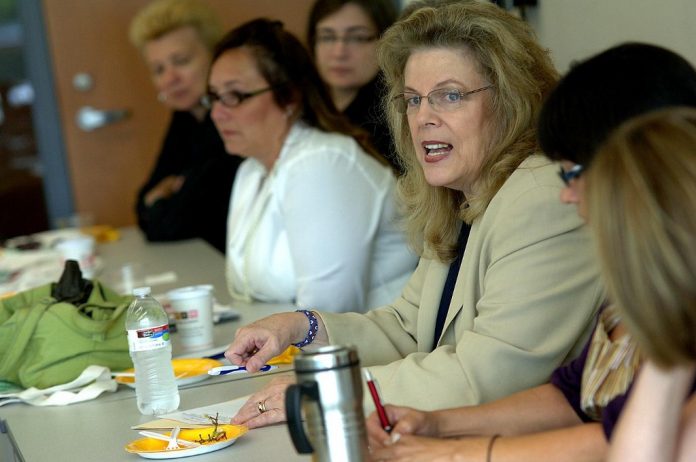Loretta Vasso details what she has learned from owning a business. JENNY SWIGODA / TIMES PHOTO
Sometimes, it really is about who you know.
Anyone starting a business realizes that quickly. It’s almost a grotesque understatement that there’s a lot to do. Maybe nobody’s going to help you do it all, but there might be someone who can give you a little of that “been there, done that” advice.
Talking to other business owners, or to people who provide services to businesses, is the whole idea of networking.
On Aug. 16, that’s what almost 30 women did during a session at Community College of Philadelphia’s Northeast Regional Center that was arranged by the Professional Women’s Business Network, under the auspices of the college’s Center for Small Business Education, Growth & Training.
Joining the entrepreneurs were the people who could advise them on the resources that are available, and also share some of their experiences.
And goofs.
Talking about starting a business in a comfortable and informal setting with people who already are in business lets the new entrepreneur know about problems that can be avoided, said Ngozi Bell, regional advocate for the U.S. Small Business Administration.
“In this group, you meet people who have opened — and closed — businesses,” she said. “You don’t have to make the same mistakes.”
There are plenty of ways to go wrong. Just skip some of the steps necessary for success.
Planning is important, Bell said, as is realizing you might know what you want to do and how to do it, but there might be a lot of other things you don’t know. “Sometimes, you really don’t know what you’re walking into. Planning is crucial,” she said. “Start simply, but write it down.”
As you do that, you’ll start to have questions about competition, location, finances and risk.
Networking lets you in on the aspects you might not know well.
Financing is one.
“A lot of businesses are going under because they don’t have the working capital,” said Theresa Guldin, assistant vice president at VIST Bank on Verree Road.
Getting the money to open and stay open involves providing lenders with lots of information on your business plan, your experience and your employees’ experience, Guldin said.
“It’s not that simple to walk in a bank and get a loan,” she added.
Borrowing involves risk because lenders want collateral for loans, Guldin said.
That could involve risking personal property, she said, but “if you’re that strong, use your house” to raise the money you need.
Jacqueline Baskerville risked her 401(k) plan to start her business, she said, but instead of starting a new enterprise, she incorporated herself and bought a franchise for Tutor Doctor, a tutoring service.
Buying a franchise got her into a pre-established business whose operators provided her with training and advice. She started her business in May.
“I can call the president of the company for help,” she said.
But at last week’s networking session, which focused on “working your dream,” Baskerville met another businesswoman who answered some of her bookkeeping questions.
Baskerville’s advice? Personalize your service. Her tutors go into people’s homes, she said, so she must build strong relationships with her clients. “The personal touch goes a long way,” she said.
There are other relationships that must be established, Bell said. Businesses that provide yours with services or materials are interested — and invested — in your success, she said.
“Some people feel they don’t need anybody,” Guldin said. “I need everybody!”
Those other businesses with a stake in your success can offer services and advice or refer you to others who can help, Guldin said.
For example, the SBA offers plenty of help for entrepreneurs, Bell said. Lots of businesses are subject to regulations — federal, state and local — and the SBA has information on those rules.
Business owners have to find out about the regulations that concern them because ignorance of those rules can get them closed down, she said.
Some new entrepreneurs don’t understand the amount of work — and the hours — involved in starting a business.
Baskerville is positive about that. She said she once had a job that required her to work a lot of overtime. Her attitude was that, if she was going to work so hard, she might be better off working for herself.
One of the challenges Baskerville sees ahead is managing her business’ growth.
“I think of expanding. I will need more people,” she said.
Finding solid employees is a very big deal for business owners, Bell said.
They also have to be treated well enough and paid well enough that they’ll feel invested in the business themselves.
Part of a business plan includes coping with hard times. And some people don’t know how to deal with difficult economic realities, said Guldin.
“Some people use hard times as an excuse,” she said.
Baskerville started her business in a downturn, she said, and is working to make it a success.
“I refused to participate in the recession,” she said. ••
Reporter John Loftus can be reached at 215–354–3110 or [email protected]
Plugged in . . .
Philadelphia resident Phyllis Smith founded the Professional Women’s Business Network almost three years ago and has expanded throughout the region.
It’s about “women helping women,” she said last week. “It’s a passion I have to help other women. Our meetings are unique. We get people to share tips” on how they cope with running their businesses.
There is no charge for meetings, and the group is not financially supported by anyone, she said. Smith is preparing to apply for non-profit status.
Last week’s meeting at the Community College of Philadelphia’s Northeast campus on Townsend Road was the first for PWBN’s newly formed Northeast group.
For more information, visit pwbn.weebly.com or e-mail [email protected] ••





